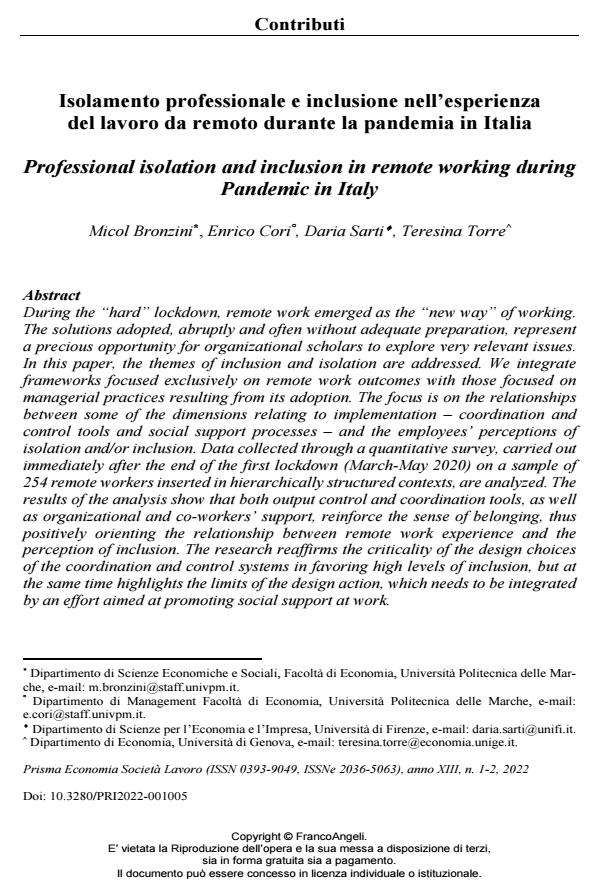Isolamento professionale e inclusione nell’esperienza del lavoro da remoto durante la pandemia in Italia
Titolo Rivista PRISMA Economia - Società - Lavoro
Autori/Curatori Micol Bronzini, Enrico Cori, Daria Sarti, Teresina Torre
Anno di pubblicazione 2023 Fascicolo 2022/1-2
Lingua Italiano Numero pagine 22 P. 68-89 Dimensione file 344 KB
DOI 10.3280/PRI2022-001005
Il DOI è il codice a barre della proprietà intellettuale: per saperne di più
clicca qui
Qui sotto puoi vedere in anteprima la prima pagina di questo articolo.
Se questo articolo ti interessa, lo puoi acquistare (e scaricare in formato pdf) seguendo le facili indicazioni per acquistare il download credit. Acquista Download Credits per scaricare questo Articolo in formato PDF

FrancoAngeli è membro della Publishers International Linking Association, Inc (PILA), associazione indipendente e non profit per facilitare (attraverso i servizi tecnologici implementati da CrossRef.org) l’accesso degli studiosi ai contenuti digitali nelle pubblicazioni professionali e scientifiche.
Durante il lockdown, il lavoro da remoto è divenuto il “nuovo modo” di lavorare. Le soluzioni adottate, repentinamente e spesso senza una adeguata preparazione, rappresentano, per gli studiosi di organizzazione, una preziosa opportunità di esplorare questioni molto rilevanti. In questo articolo si affrontano i temi dell’inclusione e dell’isolamento. Nello studio, i risultati del lavoro a distanza vengono analizzati in modo integrato rispetto alle pratiche manageriali derivanti dalla sua adozione ed il focus è sulle relazioni tra alcune delle dimensioni relati-ve all'attuazione – strumenti di coordinamento e controllo e processi di supporto sociale – e le percezioni di isolamento e/o inclusione da parte dei dipendenti. I dati analizzati sono stati raccolti attraverso un'indagine quantitativa, effettuata subito dopo la fine del primo lockdown (marzo-maggio 2020) su un campione di 254 lavoratori da remoto inseriti in contesti strutturati gerarchicamente. I risul-tati dell'analisi mostrano che sia gli strumenti di coordinamento e controllo dei risultati, sia il supporto organizzativo e quello dei colleghi rafforzano il senso di appartenenza, orientando positivamente il rapporto tra esperienza di lavoro a distanza e percezione di inclusione. La ricerca ribadisce la criticità delle scelte di progettazione dei sistemi di coordinamento e controllo nel favorire alti livelli di inclusione, ma allo stesso tempo evidenzia i limiti dell'azione progettuale, che ne-cessita di essere integrata da uno sforzo volto a promuovere il supporto sociale sul lavoro.
Parole chiave:Lavoro da remoto, isolamento professionale, inclusione, coordi-namento e controllo, supporto sociale, pandemia da Covid-19
- Fostering quality and well-being: remote work strategies in italian SMEs Marino Pezzolo, Ugo Ascoli, in STUDI ORGANIZZATIVI 2/2025 pp.59
DOI: 10.3280/SO2025-002003 - Augmenting Human Resource Management with Artificial Intelligence Aizhan Tursunbayeva, pp.63 (ISBN:978-3-031-75265-0)
Micol Bronzini, Enrico Cori, Daria Sarti, Teresina Torre, Isolamento professionale e inclusione nell’esperienza del lavoro da remoto durante la pandemia in Italia in "PRISMA Economia - Società - Lavoro" 1-2/2022, pp 68-89, DOI: 10.3280/PRI2022-001005